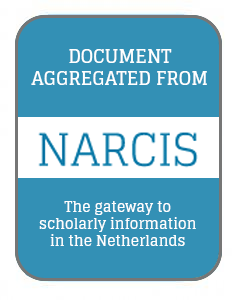Focal point
Location
National Academic Research and Collaborations Information System (NARCIS) is the main Dutch national portal for those looking for information about researchers and their work. NARCIS aggregates data from around 30 institutional repositories. Besides researchers, NARCIS is also used by students, journalists and people working in educational and government institutions as well as the business sector.
NARCIS provides access to scientific information, including (open access) publications from the repositories of all the Dutch universities, KNAW, NWO and a number of research institutes, datasets from some data archives as well as descriptions of research projects, researchers and research institutes.
This means that NARCIS cannot be used as an entry point to access complete overviews of publications of researchers (yet). However, there are more institutions that make all their scientific publications accessible via NARCIS. By doing so, it will become possible to create much more complete publication lists of researchers.
In 2004, the development of NARCIS started as a cooperation project of KNAW Research Information, NWO, VSNU and METIS, as part of the development of services within the DARE programme of SURFfoundation. This project resulted in the NARCIS portal, in which the DAREnet service was incorporated in January 2007. NARCIS has been part of DANS since 2011.
DANS - Data Archiving and Networked Services - is the Netherlands Institute for permanent access to digital research resources. DANS encourages researchers to make their digital research data and related outputs Findable, Accessible, Interoperable and Reusable.
Members:
Resources
Displaying 296 - 300 of 1863Co-evolution of soil and water conservation policy and human-environment linkages in the Yellow River Basin since 1949
Policy plays a very important role in natural resource management as it lays out a government framework for guiding long-term decisions, and evolves in light of the interactions between human and environment. This paper focuses on soil and water conservation (SWC) policy in the Yellow River Basin (YRB), China. The problems, rural poverty, severe soil erosion, great sediment loads and high flood risks, are analyzed over the period of 1949–present using the Driving force–Pressure–State–Impact–Response (DPSIR) framework as a way to organize analysis of the evolution of SWC policy.
Evaluation of effects of agri-environmental measures on rangeland degradation in two less favoured areas in Portugal
Evaluation of effects of agri-environmental measures on rangeland degradation in two less-favoured areas in Portugal
Nadia Manuela Jones
Self-build in the UK and Netherlands: mainstreaming self-development to address housing shortages?
This paper examines approaches to self or custom-build in the Netherlands and the UK to offer comparative insights into self- and custom-built housing contexts and cultures, and specifically, the relationships with local and strategic planning arrangements. The paper reviews arguments for self-build as a means to address housing shortages and examines the evidence of completions in practice. It positions the discussion in light of arguments that self-build can become a mainstream source of housing provision.
From frustration to integration: Action strategies for a better fit between knowledge and policy on the Wadden Sea
How can knowledge help to produce better policy for the Wadden Sea? This is the question that our research projects have sought to answer. Although the Wadden region offers many fine examples of knowledge development that is effectively aligned with policy issues, we can see that the relationship between knowledge and policy is often far from optimal. By way of this document we hope to help bring about a better fit between knowledge and policy.
Tweede externe audit van de Basisregistratie Kadaster : rapportage en verklaring over de kwaliteit van de BRK
De kadasterwet stelt dat er elke drie jaar een audit moet plaatsvinden op de kwaliteit van de authentieke gegevens van de Basisregistratie Kadaster In 2015 heeft Alterra voor de tweede maal deze audit uitgevoerd d.m.v. interviews en literatuurstudie. Dit rapport bevat de bevindingen en aanbevelingen van deze audit, inclusief een verklaring over de kwaliteit van de Basisregistratie Kadaster.


